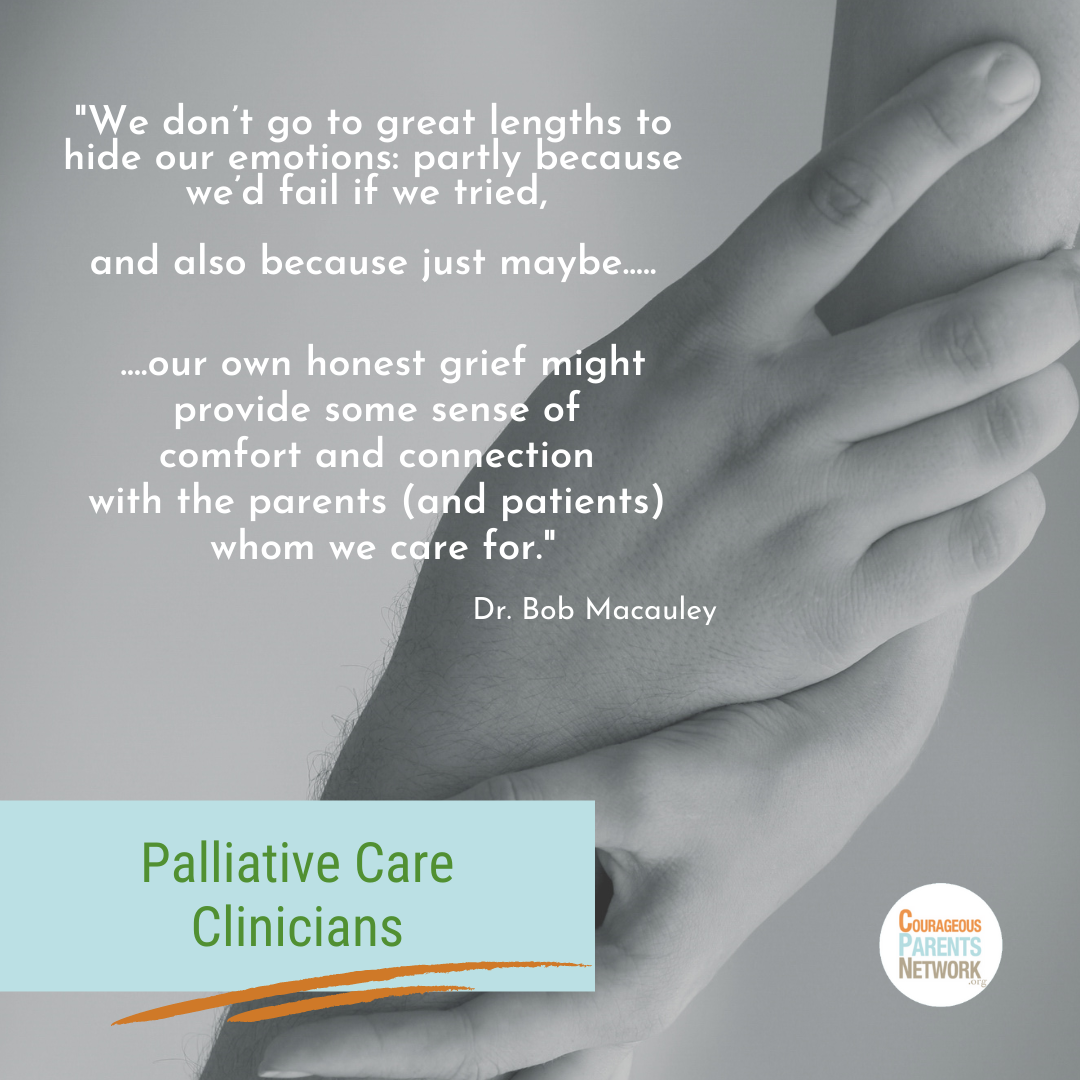As part of the 2021 Courageous Provider Award event, recognizing three clinicians — Monica Holland, Hanna Epstein, and Carly Levy — Dr. Bob Macauley made these remarks (you can listen to him read them or read for yourself). We encourage you to watch the related video at the bottom, featuring the three clinicians and their nominating parents.)
I’ve lost count of the number of times when, after a heart-wrenching conversation about goals of care or potentially redirecting a child’s treatment to focus on comfort, the parents of that patient have said to me or a member of our team, “You have the hardest job.” To which, on every occasion, I’ve responded by looking them in the eye and saying, “I know of one other job that is way, way harder.”
I don’t understand what it feels like to lose a child. Lord knows I’ve tried to imagine it, in order to truly empathize with what the parents I work with are going through. That’s probably not the healthiest thing to do, as a wise therapist-friend of mine observed some years ago when I told him of my habit. “Just stop,” he said, interrupting me for probably the only time in our friendship, going on to observe that we humans aren’t designed to lose our children. We aren’t even designed to imagine losing our children, especially on a daily basis and in rare and unexpected ways.
However unwise it may have been, it was ultimately a futile quest, anyway, because some things are so incomprehensible—and so unfathomably wrong and unjust—that they defy imagination. Which is why you should never say to a bereaved parent that I know how you feel. (Seriously, if there’s one phrase that should get you disqualified from practicing PPC, that would be it.)
But it’s not like I—or the other members of the pediatric palliative care team that I’m privileged to be a part of—don’t feel anything. Quite the contrary: we grieve and rage and mourn on practically a daily basis, coming close enough to the fire of sorrow—even if we aren’t engulfed by it, as parents are—that we are singed and, often, scarred.
We don’t go to great lengths to hide those emotions, either, partly because we’d fail if we tried, and also because—just maybe—our own honest grief might provide some sense of comfort and connection with the parents (and the patients) whom we care for. Because even if we can’t understand what parents are feeling, we can at least be witnesses to the intense love they bear for their children. And we can carry the memory of those children with us, of a smile or a favorite activity or words of unexpected wisdom that defy their age in years. I’ll always remember what the mother of one of my favorite patients said to me, years after he died: “My worst fear isn’t that he’ll die, because he already did. Now it’s just [his dad] and me talking about him, and my worry will be that it’ll be like he never existed. That he never happened.”
But he did happen, like all the other amazing kids it’s been our privilege to care for. And they deserve honor and care and dignity during their lives, and to be remembered long after their death. Which is a big part of palliative care: not just “grief support,” but sharing in that grief. Because even though palliative care professionals can never know how parents feel, I think we do know how it feels: to lose someone you love and respect and admire, and have a hole in your heart that thankfully will never entirely close. And on my best days I dare to hope that shared grief is less piercing, and shared joy is a source of comfort and community.
As you’re about to see in the following testimonials, this year’s award recipients embody that commitment to patients and families, from the time of diagnosis, through the myriad ups and downs—sharing hopes and fears in equal measure—and not stopping after a patient dies. Because that child did happen, and that parent will always be a parent, and our lives—as people who work in pediatric palliative care—will forever be changed as a result of encountering them both.
I’m honored to be a part of today’s event to celebrate my dear friend Monica, who it’s been my privilege to work alongside for the past four years, and Carly and Hanna. You bring honor to the work we are called to do, comfort to the patients and families we serve, and courage and dedication each day to—though not the hardest job of all—one that is indeed hard, in the sense that it asks everything of you, because the stakes don’t get any higher.
